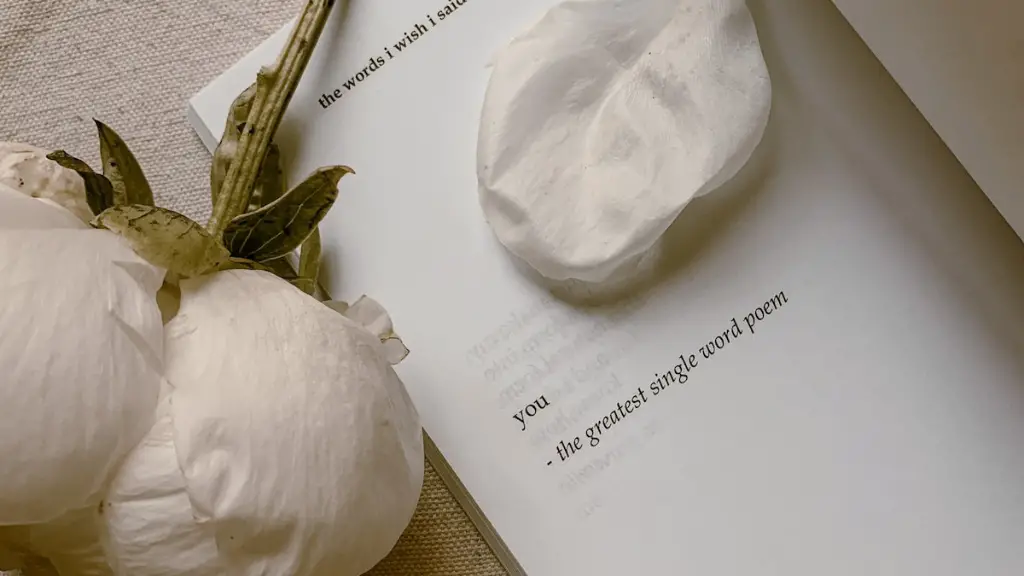Most people, at some point in life, wrote poetry. It is a crucial way to express our feelings and thoughts, even though it can be daunting. Whether we put our poems aside for many years or just temporarily stopped writing, the spark may eventually return and with it the urge to return to writing poetry again. But although the desire may be there, the idea of starting from scratch after some time away can be intimidating. In this article, I’ll teach you how to get back into writing poetry and offer guidance for maintaining a consistent level of production.
Background Information
Writing poetry can be an extremely freeing and cathartic process, enabling us to get our thoughts, ideas, and feelings off our chests in a concise and meaningful way. Not only can we express ourselves more freely, but having the opportunity to take a step back, explore the complexities of a situation, and hone our raw thoughts into poetic lines can help us to cope better with various issues. Writing poetry can help illuminate difficult truths, draw strength from introspection, and capture previous, romanticized memories. All of these elements come together to create a powerful form of expression that can be used to both bring clarity and solace.
However, as often happens with many creative pursuits, a kind of writer’s block can appear that prevents us from throwing our ideas and feelings onto the page. This is especially true with regards to poetry, which can often be viewed as a form of art, making the fear of producing no good significantly higher. The answer is to take a step back, look at the bigger picture, and develop a strategy. Here are some tips to help get you back into the swing of writing poetry.
Set Achievable Goals
It can be hard to get back into regular writing after taking a break, so it’s important to set achievable goals. This could be committing to writing a certain number of words each day, or being consistent with your writing by writing at the same time every day. It can be helpful to establish a writing goal that is specific and measurable. As you progress and become more comfortable, you can gradually raise the stakes and expectations.
Setting learning goals is also great for getting back into poetry. You can challenge yourself to learn about a specific subject, perfect specific techniques, or explore different forms of writing. This allows you to dip your toes back into the waters and motivate you to write something from that learning.
Broaden Your Horizons
If you’ve been away from poetry for a while, it can be easy to get stuck in a rut, so it might be worthwhile to broaden your horizons and explore some new aspects of poetry. This could be exploring different forms, such as Japanese haiku or free verse, or sampling the works of certain poets. Reading the work of well-known poets and attempting to imitate their style can help to hone and solidify your own craft.
Exposure to different styles of poetry can also help to inspire and motivate you. Once you’ve read or viewed some new works, you’ll likely be in a better position to come up with some creative ideas of your own.
Open Your Mind
It can be hard to open ourselves up to our feelings and attempt to write about the things that really matter to us. It is important to remember that writing should be an enjoyable experience. Try getting into a relaxed mental state and allowing your mind to wander. Writing should be a liberating and creative process, so don’t be afraid to take risks and experiment with new ideas.
Don’t be too hard on yourself either. Remember that writing is often a practice of trial and error. If you don’t like something you have written, just move on to the next poem. Writing can often be a slow process, so go at your own pace and stay focused on enjoying the overall experience.
Experiment with Form
Experimenting with form can help to reignite our enthusiasm for writing. Rhyme schemes and specific syllable patterns can make a poem sound more structured, allowing us as writers to exercise our creativity with greater precision. Alternatively, attempting to create longer form poems, such as sonnets, can help to bring out hidden depths in our lines and can often bring about completely unexpected results.
Exploring these different forms can also make it easier to find the words that express what you truly wish to convey. Working within a structured form can enable the writer to better focus their ideas, helping us to find the emotion that we wish to capture.
Seek Advice & Critique
Seeking advice or criticism from fellow poets can be a great way to get back into writing poetry. Having someone offer their perspective on our work can offer a valuable outside perspective. Joining Facebook groups or online forums that are dedicated to poetry can be a great way to get started. You will often be able to post your poems, receive feedback, and engage in meaningful conversations about what makes a good poem.
Sometimes all it takes is talking to someone who truly understands what you are trying to achieve to get the motivation to start writing again. Criticism can be just as important as compliments when it comes to refining and honing your craft, so don’t be afraid to ask questions.
Start Small
Don’t jump in to writing a full-length poem straight away. Start small and take your time, as it can often take a while for ideas to sink in and for the creative process to start flowing. Consider writing poems about simple concepts or ideas that are easy for you to grasp and build upon. This can be a great way to build up confidence in your writing, as you will have something tangible to work from.
Additionally, writing should be fun, so don’t be afraid to experiment. Oftentimes, coming up with something completely unexpected can be the best way to get jolted back into writing. Don’t be afraid to bend the rules, either. Writing is all about setting and then breaking your own conventions.
Try Writing Exercises
Writing exercises are a great way to hone your skills as a poet, as they can help to get you thinking in new and creative ways. Exercises can be used to sharpen your skills and help you to focus on certain elements of your work, such as your diction, imagery, and structure.
There are a multitude of writing exercises to choose from, such as poetic rewrites, theme studies, and fill-in-the-blank activities. Re-writing an existing poem can be a great way to help you re-engage with the writing process and inspire you to come up with fresh ideas of your own. Other activities, such as creating found poems, can also be a fun and creative way to get back into the groove.
Edit Your Poetry
Editing your poetry is an often overlooked, but essential, part of the process. Editing can be used to help refine our messages, sniff out weak lines and clichés, and generally help to clarify our voice. Editing your work, whether it be through a spellcheck or just reading aloud to yourself, can help to make sure your words have the desired effect.
Additionally, writing isn’t a static process. You can continue to revise and shape your poem as you go along. Striking the perfect balance between being unstructured and organized is often the key to creating great poetry.
Stay Positive & Continuously Learn
It can be easy to get frustrated and disheartened if certain works don’t end up how we want them to, but if you stay positive and exercise patience, you can find that the fruits of your labour are slowly but surely revealed. Additionally, reading and learning new literary techniques, such as personification, can help in creating more captivating poetry. By continuously learning new approaches and working hard to perfect them, your words will carry more weight and your writing will become more sophisticated.
As with any creative pursuit, the best way to learn is to keep at it and strive for perfection. Don’t be afraid to step out of your comfort zone and challenge yourself. If we adopt the attitude that our work is never truly finished and strive to push ourselves to continually grow and adapt, we’ll soon find our love for poetry rekindled.
Explore Topic Further Through Literary Devices
Exploring the underlying topics of a poem can bring valuable insight into how it was written and the context in which it was created. Examining images, metaphors, or similes can shed light on the intended message, and taking a look at the rhythm and musicality of a poem can enable us to better understand its cadence. When these elements are combined, they can become powerful tools for conveying meaning and emotion.
Taking the time to analyse our work can help us to identify the elements that we excel at, enabling us to bring these into our own poems and create unique pieces of writing – pieces that no one else could have written as we have.
Find A Writing Community
Writing can be a powerful, yet often isolating experience. Having a close group of people to share our work with and provide support can be immensely beneficial in the pursuit of becoming a great poet. Engaging with other writers allows us to receive constructive criticism and feedback, which can help us to grow and develop into better poets.
Having people to talk to also helps to alleviate the anxiety associated with putting our creations out into the world. Social media and online platforms, such as Reddit and Twitter, provide great resources for writers from all walks of life to come together and discuss their work. Talk to like-minded people and explore new ways of writing, and you may find the perfect support system.
Take Time for Yourself
The most important lesson to remember when it comes to getting back into writing poetry is to take time for yourself. Writing is often a personal endeavour and should be seen as an act of self-care. Therefore, it’s essential to set aside time for you to focus on your work. Schedule time in your diary for writing, and make sure to nurture your own wellbeing. Allow yourself time to think, wander and daydream in order to come up with the best poetry.
Additionally, allow yourself the time and space to explore. Simply by going out into nature, attending an exhibition, or reading a book can often help to spark creativity. Doing activities that allow you to break out of regular routines can often provide unexpected inspiration for great ideas.
Make Writing A Habit
Once you have embraced writing as a form of self-expression, it can be helpful to start making writing a habit. Establishing certain rituals can help to make writing more enjoyable, trigger creativity, and reduce anxiety. Incorporate reading, drawing, and other activities into your daily life to open yourself up to new and exciting ideas. Make writing a part of your life and find ways to reward yourself. Seize all possibilities to write and allow your thoughts to flow freely.
Writing poetry can be an incredibly rewarding experience, but sometimes taking a break and returning to the craft can be a daunting task. By learning how to get back into writing, exploring new methods and forms of poetry, taking time to read and be inspired, and seeking support from others, you can be well on your way to regaining the confidence to write again and become a better poet.





